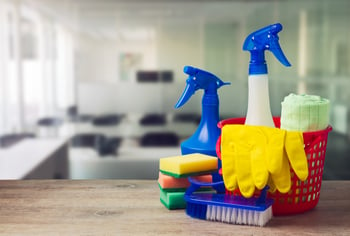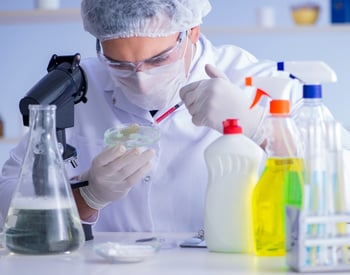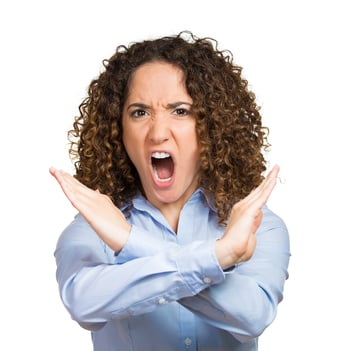Cleaning your solid surface countertops with the wrong cleaners and tools can cause a big Oops! moment.
Considering that countertops are a significant investment, an oops moment can be a costly mistake to fix. Especially in laboratories and manufacturing spaces, workers may use harsh agents and abrasive tools to ensure an environment meets cleanliness requirements. If these cleaning agents damage your countertops, you may be faced with expensive repairs.
If you have determined that solid surface countertops can withstand the conditions of your workspace (if not, visit our article, Are Solid Surface Countertops Right For Your Lab?), it’s important to familiarize yourself with the maintenance they require once installed.
Here are some do’s and don’ts of how to clean solid surface countertops, as well as some tips to keep this type of countertop in top shape.
DO: Use A Mild Cleaner To Remove Dirt And Residue
Dirt and residue are common in any environment. To clean your solid surface countertops, use either mild dish soap and water or an ammonia-based cleaner. (Avoid window cleaners, however, since they leave waxy-buildup on the surface.)
soap and water or an ammonia-based cleaner. (Avoid window cleaners, however, since they leave waxy-buildup on the surface.)
Use a damp microfiber cloth to wipe down the surface to avoid scratching the surface. You can also towel dry the surface to eliminate water spots.
DON’T: Use Chemicals That Aren’t Safe For Solid Surface
The chemicals and substances you use in your laboratory are the most important factors in determining whether solid surface countertops are right for your workspace. As long as you are not using harsh chemicals like acid drain cleaners, methylene chloride (paint remover) or strong chlorinated solvents, solid surface countertops can be a great addition to your space.
Suppose a solid surface countertop comes in contact with these harsh cleaners. In that case, lab technicians should immediately flush the surface with water because chemical contact can damage the surface for even a short amount of time.
If you anticipate that the purpose of your lab may change and that you may need to use harsher cleaning products in the future, another countertop like chemical laminate may be a better option.
DO: Disinfect When Needed
Although disinfection is often associated with strong chemicals that can damage solid surface countertops, it doesn’t mean disinfection isn’t possible.
doesn’t mean disinfection isn’t possible.
It is generally OK to disinfect your countertops occasionally using diluted household bleach. The Centers for Disease Control and Prevention recommends a 1:100 ratio for disinfection. For every gallon of water, use 5 tablespoons of bleach.
Employees can also use powdered abrasive cleaners with bleach, but this cleaning agent is typically better suited for Corian solid surface countertops if used on matte finishes. This process will likely dull a semi-gloss or gloss finish.
That’s why it’s important to check your manufacturer’s recommendations for guidelines on how to disinfect your specific brand of solid surface countertops.
DON’T: Treat All Stains The Same Way
Stains happen, and when they do, it’s important to know how to treat them best. The good news is that solid surface countertops are generally resistant to stains. However, a damp microfiber cloth and a standard household cleaner can remove most stains that do occur.
surface countertops are generally resistant to stains. However, a damp microfiber cloth and a standard household cleaner can remove most stains that do occur.
For solid surface countertops with matte or semi-gloss finishes, use cleaners made with oxalic acid to remove brown stains. For stains from vinegar, dyes, citrus, juices and blood, workers can use a damp cloth and a small amount of mild abrasive cleaner.
Hard water stains can be problematic as well, depending on your facility’s location. If hard water builds up over time, stains may impact your countertops. According to Corian, applying a “Viakal” gel can remove these types of stains. The manufacturer recommends leaving the gel on
for two to four minutes and removing it with a damp microfiber cloth. Employees should then use a second clean microfiber cloth to rinse the area with water thoroughly.
For countertops with a high gloss finish, it is better to use professional tools to restore the high gloss finish after a stain occurs.
DO: Clean Up Water Right Away
Although solid surface countertops are water-proof and non-porous, it’s still important to clean up any water left on the surface.
When water dries on a solid countertop, a film can build up. This film will eventually dull the surface, which can make your countertop appear uneven or blotchy. Employees can prevent this from happening by simply wiping up any residual water left on the surface with a microfiber cloth.
DON’T: Cut On Solid Surface
Since solid surface countertops are manufactured with multiple layers, it gives them a strong resistance to impacts. However, one of the drawbacks of installing solid surface countertops is that this material is more prone to scratches when compared to other countertops often found in labs like epoxy resin.
If your lab regularly uses sharp tools, another countertop material may be a better choice. However, lab technicians can also use cutting boards to cut as well.
If small scratches appear, you can often repair them yourself using an abrasive pad or grit sandpaper and cleaner. That’s because solid surface countertops are uniform all the way through.
Anything larger than a minor scratch, or any type of scratch on a high gloss finish, will require professional tools to restore a high gloss finish if a scratch occurs.
DO: Maintain Best Practices
Solid surface countertops offer many benefits to workspaces, including their durability and easy maintenance. They also feature invisible seams, making them aesthetically pleasing.
It’s important to implement best practices when cleaning your solid surface countertops to maintain their attractive appearance. Best practices include:
- Using mild cleaners and avoiding harsh chemicals
- Following manufacturer’s guidelines for disinfection
- Treating stains using cleaning agents that won’t damage your countertop
- Removing standing water right away
- Avoiding actions like using sharp tools that can inflict damage
The manufacturer and distributor you use for your solid surface countertops should also provide you with any cleaning guidelines so that you can rest assured that you are protecting your investment.


